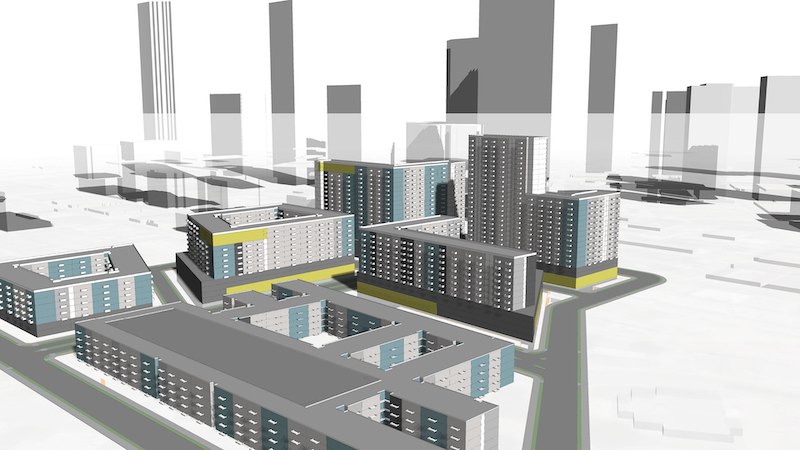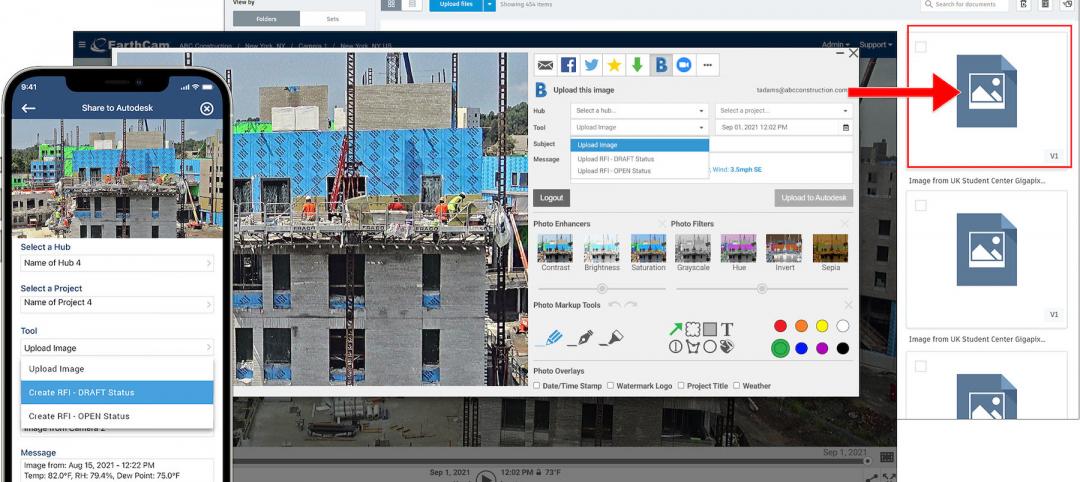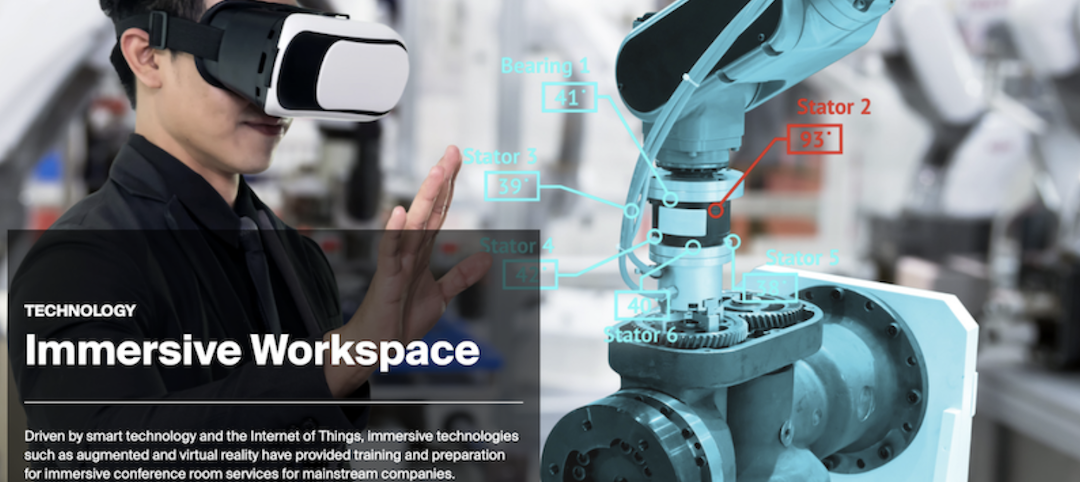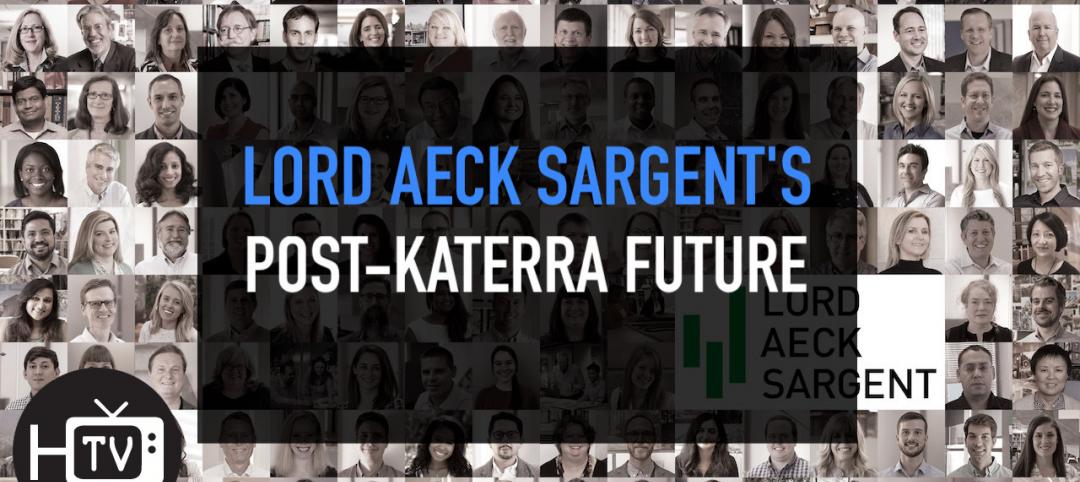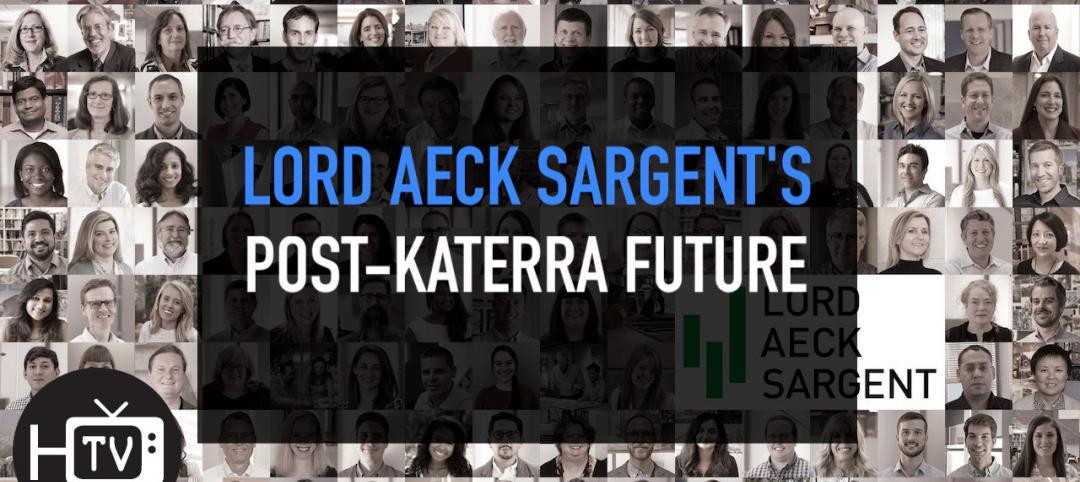Testfit
Dallas, Texas
Founded: 2017
Founders: Clifton Harness (CEO), Ryan Griege (CTO)
 Structures can be generated in seconds with TestFit by simply inputting a building’s parameters. Building types and unit styles can be swapped instantly, massing adjustments can be made on the fly, and multiple sites can be reconfigured simultaneously.
Structures can be generated in seconds with TestFit by simply inputting a building’s parameters. Building types and unit styles can be swapped instantly, massing adjustments can be made on the fly, and multiple sites can be reconfigured simultaneously.
TestFit uses a data-driven approach to smart urban planing and removes barriers in the adoption of generative design. TestFit helps real estate developers, architects, and urban planners conduct feasibility studies and test fit sites for multifamily, hotel, modular, parking, and office development. Using proprietary AI algorithms, the company claims results can be produced in seconds. Building simulations can be run using multiple parameters such as geolocation and 3D contest building to build on a site’s GIS data, user-generated building schemes for comparative analysis, and time-of-day shadow generation. Building typologies can be selected from presets that include wrap, donut, tower, hotel, and podium or they can be created custom by users. TestFit data can be exported to Sketchup, integrated with Dynamo/Revit, and have 3D views exported for PDF. In 2020, TestFit announced $2 million in seed funding from Parkway Venture Capital.
Buildots
Tel Aviv, Israel
Founded: 2018
Founders: Aviv Leibovici (CPO), Roy Danon (CEO), Yasir Sudry (CTO)
Buildots was designed to enable maximum control of construction processes with minimal effort. The solution uses 360-degree cameras mounted to project managers’ hardhats to create a digital twin of the construction site and turn every site walk into process data. Once access to updated schedules and designs are loaded into the platform, Buildots uses artificial intelligence to automatically analyze and map all of the files to produce a detailed digital construction program to be tracked by the system. The process data is automatically aggregated and compared to the expected status of the project.
Buildots can help track and identify project loose ends, analyze project progress, calculate expected payments, and detect errors. In order to ensure a higher degree of accuracy and the most valuable insights, the Buildots algorithm is augmented with manual analysis and assistance during the initial weeks of a project. The platform includes features such as automated video analysis, per-trade throughput and progress analysis, a consolidated project view with “percent complete" and identification of the most urgent issues, and on-demand project status and gap, both detailed and aggregated. Additionally, Buildots can be easily integrated into existing management workflows.
AI Clearing
Austin, Texas
Founded: 2020
Founders: Michael Mazur (CEO), Adam Wisniewski (CTO)
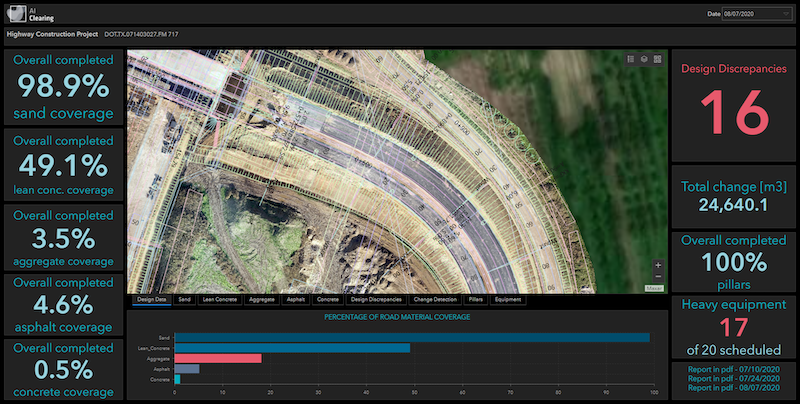 The AI Clearing dashboard (below) for a highway construction project. The dashboard is interactive and fully customizable for each project. Reports are also available in PDF format.
The AI Clearing dashboard (below) for a highway construction project. The dashboard is interactive and fully customizable for each project. Reports are also available in PDF format.
AI Clearing is an artificial intelligence-powered construction progress monitoring solution meant to help companies track the progress of work on their large civil engineering project sites. Data from schedules, CAD, BIM, and drones is used and analyzed by artificial intelligence and then sent back to the client in the form of a dashboard. This dashboard tracks metrics such as utilization of materials, completion or various layers of road surface, and the number of structures erected while also identifying even the smallest discrepancies with the design. Analyzing this data could take a human employee 20 days or more, but AI Clearing is able to do the job in 20 minutes.
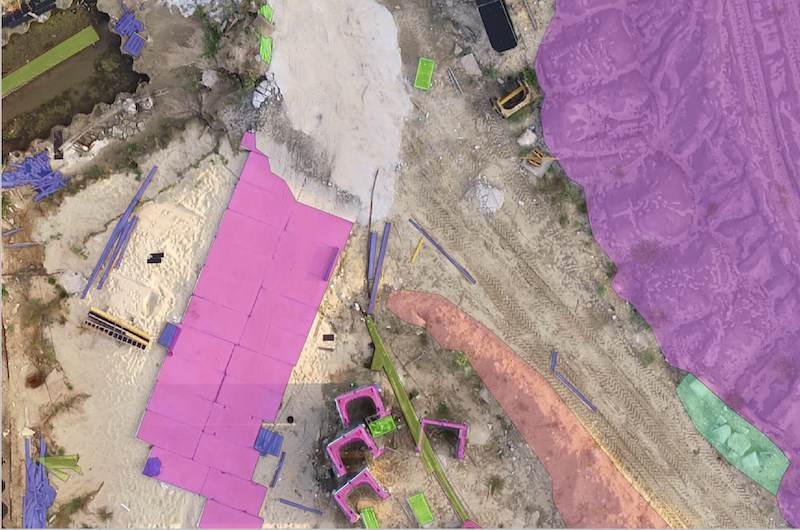 An example of an overhead drone photo with objects color-coded.
An example of an overhead drone photo with objects color-coded.
“We’ve realized that construction companies don’t want to spend a lot of time setting up systems, and they definitely don’t want to pay for yet another software license or subscription,” said Michael Mazur, CEO, Co-Founder, AI Clearing. “That’s why we structured the product the way we did. There’s one fee per project. It takes about four hours to set up the transfer of data from out clients and after that it’s automated. We pull the information in and send it back to the client in the form of analysis that’s displayed on dashboards for as many users as they want.”
Current clients include PCL Construction in the U.S. and Canada, and the French construction group Vinci. AI Clearing recently completed a $2 million seed round in December 2020 that was led by Tera Ventures from Estonia. Co-investors included Venture Partners, Innovation Nest, and other funds from places including Australia.
Related Stories
Urban Planning | Dec 15, 2021
EV is the bridge to transit’s AV revolution—and now is the time to start building it
Thinking holistically about a technology-enabled customer experience will make transit a mode of choice for more people.
Designers / Specifiers / Landscape Architects | Nov 16, 2021
‘Desire paths’ and college campus design
If a campus is not as efficient as it could be, end users will use their feet to let designers know about it.
AEC Tech | Oct 25, 2021
Token Future: Will NFTs revolutionize the design industry?
How could non-fungible tokens (NFTs) change the way we value design? Woods Bagot architect Jet Geaghan weighs risk vs. reward in six compelling outcomes.
Sponsored | BD+C University Course | Oct 15, 2021
7 game-changing trends in structural engineering
Here are seven key areas where innovation in structural engineering is driving evolution.
AEC Tech Innovation | Oct 7, 2021
How tech informs design: A conversation with Mancini's Christian Giordano
Mancini's growth strategy includes developing tech tools that help clients appreciate its work.
AEC Tech | Oct 5, 2021
EarthCam Builds On its Connectivity with Autodesk Construction Cloud
Premiering new visual verification features for Autodesk Build and BIM 360
AEC Tech | Sep 21, 2021
A new webtool follows ConTech from incubation to application and beyond
MIT and JLL have created Tech Tracker to help real estate professionals see what’s hot now and what might be.
Architects | Aug 5, 2021
Lord Aeck Sargent's post-Katerra future, with LAS President Joe Greco
After three years under the ownership of Katerra, which closed its North American operations last May, the architecture firm Lord Aeck Sargent is re-establishing itself as an independent company, with an eye toward strengthening its eight practices and regional presence in the U.S.
Architects | Aug 5, 2021
Lord Aeck Sargent's post-Katerra future, with LAS President Joe Greco
After three years under the ownership of Katerra, which closed its North American operations last May, the architecture firm Lord Aeck Sargent is re-establishing itself as an independent company, with an eye toward strengthening its eight practices and regional presence in the U.S.
AEC Tech | Jul 14, 2021
Bjarke Ingels Group and UNStudio invest in SpaceForm, a virtual workspace for architects
Squint/Opera developed the platform in 2018.


